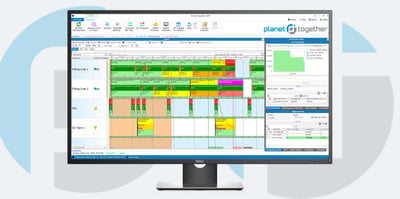Supplier Risk Assessment
In medical manufacturing, ensuring a seamless production process is not merely a matter of efficiency; it's a matter of patient safety and well-being. The reliability and quality of the components and materials sourced from suppliers play a pivotal role in the final product's efficacy. However, with the increasing complexity of global supply chains and the dynamic nature of the industry, managing supplier risk has become an indispensable task for production schedulers.
As a production scheduler in a medical manufacturing facility, your role goes beyond optimizing production schedules; it extends to safeguarding the integrity of the entire manufacturing process.
In this blog, we'll look into the crucial aspects of supplier risk assessment specific to the medical manufacturing sector. Additionally, we'll explore how the integration of advanced planning and enterprise resource planning (ERP) systems like PlanetTogether with industry-leading solutions such as SAP, Oracle, Microsoft, Kinaxis, and Aveva can streamline the process and enhance risk mitigation strategies.

Supplier Risk in Medical Manufacturing
Before looking into the intricacies of supplier risk assessment, let's first understand why it's paramount in the realm of medical manufacturing. Unlike many other industries, the stakes in healthcare are exceptionally high. A single defective component or substandard material can compromise the safety and effectiveness of medical devices, pharmaceuticals, or equipment, potentially endangering patients' lives.
Supplier risk in medical manufacturing encompasses various factors, including:
Quality Control: Ensuring that suppliers adhere to stringent quality standards is non-negotiable. Any compromise in quality can lead to product recalls, regulatory non-compliance, and damage to the brand's reputation.
Regulatory Compliance: Compliance with regulatory requirements, such as FDA regulations in the United States or CE marking in the European Union, is imperative. Suppliers must demonstrate adherence to these standards to mitigate legal and financial risks for the manufacturer.
Supply Chain Disruptions: Disruptions in the supply chain, whether due to natural disasters, geopolitical issues, or unforeseen circumstances, can significantly impact production schedules and, consequently, the availability of essential medical products.
Ethical Concerns: Ethical considerations, such as labor practices, environmental sustainability, and social responsibility, are increasingly gaining prominence in supplier assessments. Medical manufacturers must align with suppliers who uphold ethical standards consistent with their own values.
Financial Stability: The financial health and stability of suppliers directly affect their ability to fulfill orders consistently and reliably. Assessing their financial viability mitigates the risk of disruptions caused by supplier bankruptcy or financial insolvency.

Strategies for Supplier Risk Assessment
Effective supplier risk assessment requires a proactive approach and a comprehensive strategy. Here are key strategies production schedulers can implement:
Supplier Qualification and Due Diligence: Establish stringent criteria for supplier qualification, encompassing quality certifications, regulatory compliance, financial stability, and ethical standards. Conduct thorough due diligence, including on-site audits and supplier assessments, to validate suppliers' capabilities and commitments.
Risk Profiling and Prioritization: Not all suppliers pose the same level of risk. Utilize risk profiling methodologies to categorize suppliers based on their criticality, geographic location, past performance, and other relevant factors. Prioritize risk mitigation efforts based on this assessment, focusing resources where they are most needed.
Continuous Monitoring and Surveillance: Supplier risk is dynamic and evolving. Implement systems for continuous monitoring and surveillance of suppliers, leveraging real-time data and analytics to identify emerging risks promptly. Proactively engage with suppliers to address potential issues before they escalate into crises.
Diversification and Redundancy: Overreliance on a single supplier increases vulnerability to supply chain disruptions. Foster supplier diversification by cultivating relationships with multiple suppliers for critical components or materials. Additionally, establish redundancy measures to mitigate the impact of supplier failures or shortages.

Integration of PlanetTogether with ERP, SCM, and MES Systems
In the digital age, leveraging advanced planning and ERP systems is instrumental in enhancing supplier risk assessment and management. The integration of PlanetTogether, a leading production scheduling software, with industry-leading ERP, SCM, and MES systems offers several benefits:
Real-time Visibility and Collaboration: Integration enables seamless data exchange between production scheduling and ERP systems, providing real-time visibility into inventory levels, production capacities, and supplier performance. This facilitates collaborative decision-making and enables proactive risk mitigation strategies.
Predictive Analytics and Scenario Planning: By combining the forecasting capabilities of PlanetTogether with the analytical power of ERP and SCM systems, production schedulers can conduct predictive analytics and scenario planning to anticipate potential supply chain disruptions and model alternative courses of action.
Automated Alerts and Notifications: Integrated systems can automate the generation of alerts and notifications based on predefined thresholds or risk indicators. Production schedulers can receive timely alerts regarding supplier performance issues, quality deviations, or supply chain disruptions, enabling rapid response and mitigation.
End-to-End Traceability and Compliance: Integration ensures end-to-end traceability of materials and components throughout the manufacturing process, facilitating compliance with regulatory requirements and quality standards. This transparency enhances accountability and reduces the risk of non-compliance penalties or recalls.
In the high-stakes environment of medical manufacturing, effective supplier risk assessment is essential for safeguarding product quality, regulatory compliance, and patient safety. Production schedulers play a critical role in orchestrating the complex interplay between suppliers, production processes, and supply chain dynamics.
By implementing robust risk assessment strategies and leveraging the integration of advanced planning and ERP systems like PlanetTogether with industry-leading solutions, production schedulers can proactively identify and mitigate supplier risks, ensuring continuity of operations and maintaining the highest standards of quality and compliance in medical manufacturing.
Are you ready to take your manufacturing operations to the next level? Contact us today to learn more about how PlanetTogether can help you achieve your goals and drive success in your industry.
Topics: PlanetTogether Software, Integrating PlanetTogether, Real-time Visibility and Collaboration, Predictive Analytics and Scenario Planning, Automated Alerts and Notifications, Medical Manufacturing, Supplier Risk Assessment, End-to-End Traceability and Compliance, Proactively Identify and Mitigate Supplier Risks




















LEAVE A COMMENT